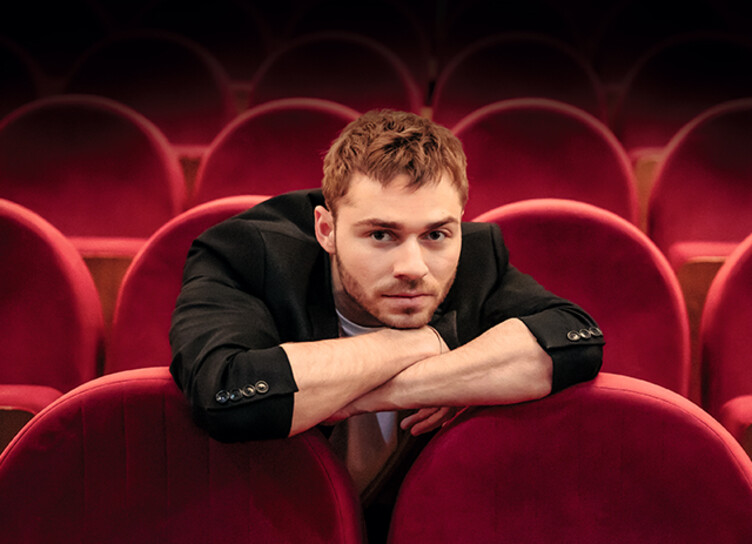______________________________
Renata: Modern cinema is a zone of experiments, computer graphics and new technologies, but the theater still relies primarily on “traditional” components: the actor, the text. Why is the theater still alive?
Kirill: He is alive because there is live communication. This became especially obvious during quarantine, when all theaters began to try to integrate into the Internet reality and record some kind of videos. I felt: here we are useless, here we are losing to bloggers, to everything that has been created in this organic Internet. We tried to read Pushkin’s “A Feast in the Time of Plague”, but it was vulgar and boring. The theater outside the theater is very weak, it loses its magic. But this magic of live communication works in the theater itself. And the theater is alive because new people are coming. Ryzhakov always told us at the Moscow Art Theater on September 1: “Everything was in the theater – you were not there.”

At the same time, the most successful theater actors are always lured to the cinema: there is money and fame …
Not everyone is lured away, there are only theater artists who are geniuses in the theater, they give themselves to it, the audience adores them, but they will not take root in the cinema. There is a huge difference between theater and film acting. It was only on the tenth project that I realized how theater and cinema are different professions. And if I understand and know a lot about myself – theatrical Kirill – then in the cinema I understand myself much worse. In our country, they don’t teach acting in films at theatrical institutes, although we receive a diploma “Theatre and Film Actor”. I am currently reading a book by an American author, How to Go to Castings, and I understand that the Moscow Art Theater should open a separate course on cinema, at least once a week! While the theater in Russia wins cinema, we have a powerful theatrical culture. For example, I am from Omsk – it is a very theatrical city, my mother goes to the theater there almost every day.
In 2017, you played in the play “The Cripple of Inishmaan” based on the play by Martin McDonagh. This year, McDona presented the third part of this trilogy – the film “Banshee of Inisherina”. It seems that this director was able to conquer both theater and cinema …
I’m a McDonagh fan, he’s cool! I recently went to study as a screenwriter at Bondarchuk’s Industry. In one of the classes, we analyze the scripts of famous films. We studied the screenplay of McDonagh’s film “Three Billboards Outside Ebbing, Missouri” in the original and in translation: you read the script and you literally see the film. As written, so taken. How he does it? In terms of script, he is my idol!
The main hit with your participation in the Pushkin Theater is Shakespeare in Love: you play Shakespeare himself. And what kind of roles do young people dream of, still about Hamlet?
In the theatre, I have no such dream. I would like to play Russian classics, in Chekhov’s Three Sisters, for example. But they haven’t given me yet. Maybe he hasn’t matured, maybe my director hasn’t come yet. But in the cinema, I dream of playing the traveler Fyodor Konyukhov.
People always went to the theater not only for art, but also for fame. Today you can become famous on TikTok. Is acting still an elitist profession or is it depreciating?
We often say that our profession is depreciating, that no one needs actors. I recently watched Molochnikov’s “Monastery” with Ivleeva – and she is a genius here in her own way, she found some right accents and did it in a very acting way. But still, this luck of hers does not mean that she could play in the theater. Yes, an actor learns his profession, lives it, and someone gets into it easier and easier. But the profession will still not go anywhere, at least as long as the theater is alive.

You are playing in Bulgakov’s Crimson Island about a young playwright whose play is to be evaluated by a censor. Who is the main censor in your life?
I myself. It’s terrible, it’s very hard, and I go too far with this. It happens that the performance was not very successful, but personally you did everything you could, you honestly worked. And there is no need to reproach yourself. Theater is a living thing. But the thought does not leave me: if a person came to the theater for the first time in his life, if he was forced, brought, he sat, he watched – and nothing good happened, he will never return in his life. And these thoughts hit me. We have no right to play badly.
The production of “The Servant of Two Masters” based on the comedy by Carlo Goldoni with your participation is music, dance, acrobatics, pure optimism. Which theater is closer to the Russian audience – such a comedy buffoon or nevertheless Shakespeare’s tragic?
It all depends on what times. Now the Russian soul comes for a holiday and laughter. We have a play “The Krause Family” – a sitcom with Vera Alentova. And somehow I watched it in the hall, and next to me was a man who looked like my father. I saw how, by the end of the performance, his humor literally melted, how his face changed. People come out of the theater and smile! Prepared people go for something difficult, but everyone needs a comedy. Why? We had a play “Knight of the Flaming Pestle”, in the finale of which the Honored Artist of Russia Agrippina Steklova says: “Yes, there is enough shit in life!”
What do you think the phrase “Beauty will save the world” means?
I never fully understood these words! But in the play “Guardians of the Taj Mahal” my character literally kills beauty. We are guards there in India, who, according to legend, cut off 40,000 hands so that nothing more beautiful than the Taj Mahal could be built in the world. Then it dawns on my character: he kills the beauty that there will be no one else to create. In our country, also according to legend, the architect of St. Basil’s Cathedral had his eyes gouged out for the same purpose. It turns out that beauty is a frightening force, there is something fatal in it, some kind of devilry.
About beauty: you once said that extraordinary women guide you through life – the engines of your destiny. Who are your muses?
I am not ready to name all the muses. (Laughs) I received my first education in Omsk in college, my master was a graduate of the Shchukin School Larisa Yakovlevna Meyerson, God rest her. Old Soviet school. I studied for four years – and took out not so much acting as an attitude to the theater. I was a young Omsk citizen, “from the district”, and she told me about art, about the theater, about the fact that you should be a person. It was the first woman who influenced my worldview. Then I was engaged in figure skating – and I had a wonderful coach. At the Studio School, my teacher Evgenia Olegovna Dmitrieva decided my fate by taking me to the course under her own responsibility, although Pisarev did not like me at first. In women, the main thing is wisdom and the ability to guide a man. I had enough men nearby, and my dad is wonderful, but for some reason you don’t listen to men’s advice like that. A woman somehow looks deeper into you, she is wiser, she is smarter.
You speak like a real knight! Knight on horseback. I know that you love horses, and it came in handy on the set of Elizabeth. Where does this passion come from?
From the village: my grandmother had an equestrian club across the fence, in which I was engaged, changing figure skating to horses. And then every summer he came and worked there for free as a groom.
Figure skating, horses… Maybe you still have some secret talents that we don’t know about?
I have been doing boxing for almost two years, it is one of the most beautiful sports. I watched the fight of Muhammad Ali – and fell in love. And this is an unreal surge of adrenaline, this is cool cardio … And I also dream of learning how to sculpt from clay, I even went to pottery courses somehow. This is the perfect meditation.

How quickly and easily did Moscow accept such an ambitious Omsk citizen?
I can tell you how quickly I got it. (Laughs) For the first two weeks I walked from the hostel along Tverskaya – and could not understand anything. Two weeks later it dawned on me that in Moscow no one cares about you. A stream of people is pouring – and you see them for the first and last time, and they see you too. And you can be completely free here. And how did Moscow receive me? I spent 24 hours a day studying, classmates called me Omich instead of Omich. I walked around in felt boots, I was kind of shaggy, unformed – and next to me were 11 Muscovites and Muscovite guys, from whom we – visitors – were very different. And when they accepted me as one of their own, and this still happened, then Moscow became my home, and I fell in love with it. I also love Omsk, but I fly there to visit, and my house is here.
You once said that you can’t limit yourself to one thing, you need to absorb the profession as a whole …
Yes, that’s why I went to study to be a screenwriter. And I’m sure I’ll stick my nose into directing. But I delay this moment, I understand that it is difficult.
Recently, you also tried yourself as a presenter – at the opening of the art project of the Pushkin Theater and Sheremetyevo Airport “The theater will not change the world, but it will change you.” How has theater changed you?
The subject of research in the theater is always a person. You study a person and love grows in you.
Does the theater begin not with a hanger, but with a person?
Exactly. From humanity.
Photo: Ksenia Ugolnikova
Producer: Anisa Ashikou
Source: Hellomagazine
Ashley Fitzgerald is a journalist and author at Gossipify, known for her coverage of famous people and their lives. She writes about a wide range of topics, including celebrities, influencers, social media stars, and public figures. Her articles are known for their in-depth analysis and unique perspective. She is respected for her ability to keep readers up to date with the latest news and trends of the famous people.








